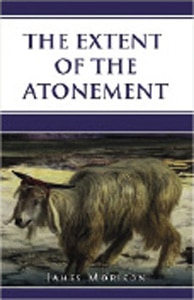
Paperback, 167 pages, Published by Scripture Teaching Library, Cookstown, Northern Ireland. ISBN 978-1-909789-23-4.
James Morison (1816-1893) was ordained in the Scottish United Secession Church, but was suspended from his ministry because he did not hold the doctrine of limited atonement. He continued to preach the gospel, and saw many souls saved. This treatise, and his companion work The Nature of the Atonement, went through many editions, and is here reprinted attractively by the Scripture Teaching Library.
The book addresses the vital question, ‘For whom did Christ die?’ Morison outlines a clear and scriptural case against the erroneous doctrine of limited atonement. He first examines the scriptural evidence in support of the truth of the universality of the atonement, especially verses which state that Christ died for all and for the whole world, so that whoever believes will be saved. Then he examines the indirect evidence in support of this truth, from a number of other verses and considerations. He also answers the objections which are often made against the universality of the atonement fairly convincingly. Finally, the last third of the book contains additional relevant observations based on the writings of many past theologians.
The treatise breathes a warm evangelical fervour and a love for souls which is very uplifting, and Morison exalts Christ throughout. However, while the reviewer thoroughly agrees with the main thesis of the book, he feels that what is effectively said could have been said much more concisely. Also, a few points which support his thesis have not been clearly stated. First, for instance, the eternal God needed to be satisfied by an infinite sacrifice for sin to solve the whole problem of sin in His universe; it was not simply the problem of our particular sins. Second, there are valuable sermons in the difference between the two prepositions huper, ‘on behalf of’ all, representatively, and anti, ‘in the place of’ the many who believe, substitutionally. Finally, insufficient note is taken of the tension and juxtaposition throughout scripture between God’s sovereignty and man’s responsibility and freewill, which is never logically explained, but required to be believed and acted upon. In practice, they work together. However, serious Bible students will enjoy the book.
Our thanks to Malcolm Davis, Leeds, England, for this review.
| Cookie | Duration | Description |
|---|---|---|
| cookielawinfo-checkbox-advertisement | 1 year | Set by the GDPR Cookie Consent plugin, this cookie is used to record the user consent for the cookies in the "Advertisement" category . |
| cookielawinfo-checkbox-analytics | 11 months | This cookie is set by GDPR Cookie Consent plugin. The cookie is used to store the user consent for the cookies in the category "Analytics". |
| cookielawinfo-checkbox-functional | 11 months | The cookie is set by GDPR cookie consent to record the user consent for the cookies in the category "Functional". |
| cookielawinfo-checkbox-necessary | 11 months | This cookie is set by GDPR Cookie Consent plugin. The cookies is used to store the user consent for the cookies in the category "Necessary". |
| cookielawinfo-checkbox-others | 11 months | This cookie is set by GDPR Cookie Consent plugin. The cookie is used to store the user consent for the cookies in the category "Other. |
| cookielawinfo-checkbox-performance | 11 months | This cookie is set by GDPR Cookie Consent plugin. The cookie is used to store the user consent for the cookies in the category "Performance". |
| elementor | never | This cookie is used by the website's WordPress theme. It allows the website owner to implement or change the website's content in real-time. |
| viewed_cookie_policy | 11 months | The cookie is set by the GDPR Cookie Consent plugin and is used to store whether or not user has consented to the use of cookies. It does not store any personal data. |